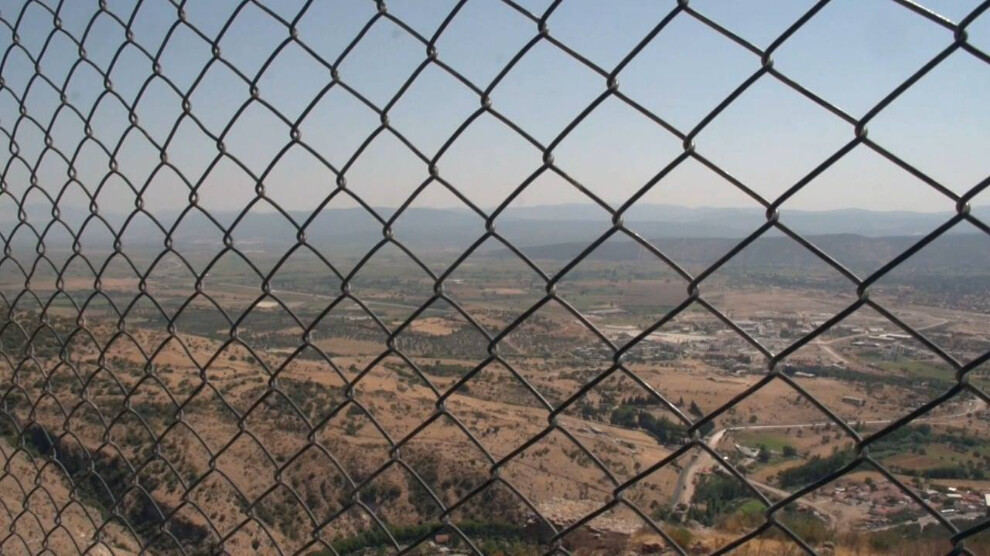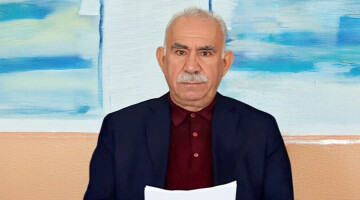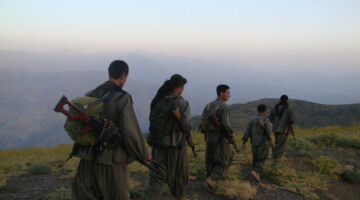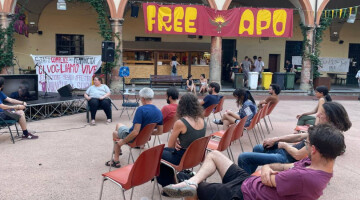Eleni Constantinides, researcher and producer of historical documentary films. “The Silence of Asia Minor”, reflects on the transformations undergone by Asia Minor, or Anatolia, from the 6th century until the Gezi process.
The silence of Asia Minor, the garden of peoples and cultures, has taken place in a dizzying way, especially in the last century.
The historical settlers' first turning into a minority, forced displacement, forced exchange, prohibition of languages and laws enacted taking into account ethnic, linguistic and religious differences, etc. have been the methods that accelerated this "silence".
We talked about Turkey's minority policy and the anti-Kurdish, aggressive policy that is still practiced today.
Why did you want to make this documentary? What happened to Asia Minor, especially from the founding years of the Turkish Republic?
One of the reasons I wanted to make this documentary, I guess, is because of my long experience as a journalist in National TV Channel in Greece, where I was responsible for the satellite programs. I had the chance to get in touch with Greeks from all over the world. Most of them were refugees from Asia Minor. In my opinion, the population exchange took place in phases. For many reasons, thousands of people chose to remain in their home lands as that is how it was for many centuries, preferring in this case to change religion and names. There are plenty of documents confirming my thesis which I drew from my personal contacts and interviews, as well as academic work from all over the world, including Turkish ones. Yusuf Halacioglu himself stated in an interview a decade ago, that he got the list of 130.000 Christians in Cappadocia. They converted to Islam just before the population exchange.
In what parameters do you think Turkey's minority policy has been transformed? For example, what are the differences between the policy against the Greek minority in the 1940s and the policy against the Kurdish minority today?
Shortly after the establishing of the Turkish Republic, Kemal Ataturk ordered the creation of the Turkish History Foundation. The core philosophy of teaching was under the slogan “we are all Turks and we speak only Turkish”. This practice, was a kind of strategy in order to homogenise the entire population, which, as we all know it was composed of a variety of different nations living in the Ottoman Empire. According to the Lausanne Treaty, there were some obligations for certain demands, especially to the education system and property ownership. After the population exchange, 180.000 Greeks chose to remain in Constantinople; Imbros (Gokceada) and Tenedos (Bozcaada). Unfortunately, this dynamic (economically and culturally) Greek population, soon after the exchange, had to follow the way to migration, as a result of systemic and well organised pressure applied by the New Republic of Turkey to them, in multiple ways. On 11 November of 1942, during WWII, the Turkish government triggered into operation the regulation law 4305, with which enforced the Varlik Vergisian unduly tax. Supposedly, the law should have been applied equally to all citizens of the State. However, it was decided a selective application of it, chosen by religion and nationality criteria. It was obvious that this action would have destroyed the non-Muslim minorities economically, in the first place. The payment deadline was defined as 15 days with no right to appeal. In case of failing to pay, they implemented confiscation of property, arrest, deportation to a forced labour camp in the city of Askale under extremely bad conditions. The number of exiled reached 2.500 people. The law was abolished in 1944, after the total destruction of non-Muslim minorities. Worth noting is the fact that, although the Greek community, at the time, used to be 0,5% of the whole, it contributed 20% of the total country’s income, all coming from the above tax charge.
After the defeat of the Ottoman Empire in World War I, the allies created the modern Middle-East. And while the Treaty of Sevres provided for an independent Kurdistan, it was never ratified. In 1923, the treaty of Lausanne created the modern States of Turkey, Iraq, and Syria, but Kurdistan was ignored. During Turkey's war for independence, Turkish leaders promised Kurds a Turkish-Kurdish federated State in return for their assistance in the war. After independence was achieved, however, they ignored the bargain they had made. As I previously mentioned about minority policy in Turkey, since 1923, for many decades the Kurdish language was ignored and banned from public use and Turkish became the lingua franca for all citizens to speak. In this way, the Turkish State sought and, in a way, has achieved it and managed to create a nation-state based on one language and attempted to eliminate the use of other languages, particularly Kurdish, through severe regulations and prohibitions. As reports have been recorded, through decades-long oppressions which resulted in mass killings, arrests, re-location of Kurds, monopolization of education in Turkish and eventually the legal ban on Kurdish in print and media, raises questions about the survival of the language in the long run… To some extent, the survival of Kurdish still remains in doubt, despite the re-introduction of Kurdish in schools and universities since 2010, because many people have already forgotten their language and do not speak Kurdish.
One of the red lines for Turkish foreign policy is the Aegean Islands. The leaders of the ruling and opposition parties are constantly making statements that the Aegean islands should be occupied. For example, last week even the head of the opposition parties talked about war with Greece. Can it be said that Turkey has Aegean paranoia? If so, what kind of paranoia is it?
Nobody can occupy anything without a victorious invasion. Turkey’s political parties just compete with each other in words, in order to impress their audience. There are International Treaties that have secured everything in regards to the Greek – Turkish state-of-affairs. Of course, Greece is aware of Turkey’s long plans in foreign affairs issues and its unhappiness with the current situation in the Aegean and the East Mediterranean. Turkey chooses to “use” the treaties selectively. Besides, everybody deserves to have dreams. However, in the context of a democratic environment, those dreams can’t be carried out at the expense of other countries' sovereignty. Greece’s thesis is well known and it’s been reflected in many ways.
In 1974, Turkey occupied Cyprus, and settled there. In 2018, Turkey occupied the city of Afrin in Rojava, and then other parts of Rojava. In the east, Turkey occupied the lands belonging to Armenia together with Azerbaijan. More precisely, the Turkish government gave military and political support to Azerbaijan. Again last year, the Turkish state came to the accompaniment of the war with the EU in the Mediterranean. How would you interpret the aggressive foreign policy of the Turkish state?
Unfortunately, we happen to have in our region a neighbour who’s intention is to interfere in other countries' business and take advantage of weaknesses that have been caused by instability, trying then to create for itself a forgone conclusion…There are a number of examples in the neighborhood, as you said, but it doesn’t seem to bother anyone of those they appear to care for justice. The power of the strong is still “alive and well”.…
In the bottom line, the fact is that, Turkey is under pressure financially as well as constitutionally. In my opinion, this situation will continue as far as the election time, and I believe it will be defused in one way or another…















